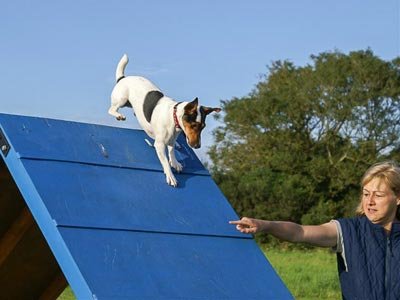Is there anything more enjoyable than watching a dog show off its amazing tricks and skills? From giving high-fives to spinning in circles, these impressive demonstrations never cease to amaze us. Today, we bring you a fresh addition to your dog’s training repertoire that is bound to steal the show – the “roll over” command. Not only is this trick entertaining, but it also offers a range of benefits for both you and your furry friend. So get ready to embark on a fun-filled journey of training and bonding as we dive into the world of the “roll over” command.
Table of Contents
- The Benefits of Teaching Your Dog the “Roll Over” Command
- Breaking Down the Steps to Train Your Dog to “Roll Over”
- Common Challenges and Solutions When Teaching “Roll Over”
- Incorporating “Roll Over” into Your Dog’s Routine for Extra Enrichment and Fun
- Tips for Reinforcing and Mastering the “Roll Over” Command
- Q&A
- In Conclusion

The Benefits of Teaching Your Dog the “Roll Over” Command
Teaching your dog the “Roll Over” command not only adds an adorable trick to their repertoire but also brings along a multitude of benefits. Here’s why you should consider incorporating this fun command into your dog’s training routine:
- Bonding: Teaching your dog new commands creates a stronger bond between you and your furry friend. Spending quality time together during training sessions not only strengthens your connection but also enhances your communication skills.
- Mental stimulation: Dogs, like humans, need mental stimulation to stay happy and fulfilled. Teaching your dog the “Roll Over” command challenges their cognitive abilities and keeps their mind active. It provides them with a mental workout that can help prevent boredom and destructive behaviors.
- Physical coordination: The “Roll Over” command involves a series of movements, including lying down, rolling on their back, and getting back up. By practicing this trick, your dog improves their physical coordination and body awareness. It can enhance their overall agility and balance.
- Confidence building: Successfully mastering the “Roll Over” command can boost your dog’s confidence. Through positive reinforcement and reward-based training, they gain a sense of accomplishment and become more self-assured. This newfound confidence often translates to better behavior in other areas of their life.
- Impressive party trick: Let’s not forget the fun factor! Showcasing your dog’s ability to roll over can be an excellent conversation starter and a delightful party trick that entertains friends and family. You and your pup will surely receive heaps of admiration and joy from others when they witness this adorable skill.
So, why wait? Start teaching your furry companion the “Roll Over” command today. Enjoy the benefits of improved bonding, mental stimulation, physical coordination, confidence building, and the endless joy that comes with witnessing your dog’s adorable trick.
Breaking Down the Steps to Train Your Dog to “Roll Over”
Training your dog to “roll over” can be a fun and impressive trick that will impress your family and friends. However, it requires patience and consistency. Below are the key steps to guide you through the training process:
Remember, training takes time, so be patient with your dog and celebrate their progress along the way. With consistent practice and positive reinforcement, your furry friend will soon be rolling over on command like a pro!
Common Challenges and Solutions When Teaching “Roll Over”
Teaching a dog the “Roll Over” trick can be a fun and rewarding experience for both dog owners and their furry companions. However, like any training exercise, there are common challenges that may arise along the way. Here are some of the most common hurdles you might encounter when teaching your dog to “Roll Over,” along with effective solutions to overcome them.
- Challenge 1: Lack of motivation: Some dogs may initially show little interest in learning the “Roll Over” trick, making it difficult to engage them in the training process. To overcome this, try using high-value treats or favorite toys as rewards to motivate your dog. Incorporate positive reinforcement techniques, such as praise and gentle petting, to make the training sessions enjoyable and exciting for your furry friend.
- Challenge 2: Lack of coordination: Dogs who struggle with coordination can find it challenging to perform the “Roll Over” trick smoothly. To address this, break down the trick into smaller steps and reinforce each step individually. Start with basic commands like “down” and “stay,” gradually progressing to rolling onto their side and finally completing the full roll. Practice patience and consistency, allowing your dog to build confidence and develop their coordination over time.
- Challenge 3: Fear or discomfort: Some dogs may be naturally hesitant or uncomfortable with the “Roll Over” position, especially if they have previously experienced physical discomfort or fear. It is essential to create a safe and trustful environment for your dog when teaching this trick. Always approach the training sessions with calmness and reassurance, ensuring that your furry friend feels secure. Gradually introduce the rolling movement using gentle gestures, and reward your dog generously for every small progress they make.
Remember, patience, consistency, and positive reinforcement are key when teaching your dog the “Roll Over” trick. By understanding and addressing these common challenges head-on, you can create a fun and effective training experience that strengthens the bond between you and your four-legged companion.
Incorporating “Roll Over” into Your Dog’s Routine for Extra Enrichment and Fun
Is your furry friend craving some extra mental stimulation and entertainment? Incorporating the “Roll Over” command into your dog’s daily routine can provide the perfect solution. This playful trick not only adds an element of fun to your dog’s day but also offers an opportunity for them to exercise their cognitive and physical abilities.
To begin, ensure that your dog is comfortable with the basic commands such as sit, stay, and lie down. Once they’ve mastered these, you can gradually introduce the “Roll Over” command. Start by commanding your dog to lie down and then gently guide them to roll onto one side using a treat as an incentive. Remember, patience and positive reinforcement are key in training any new trick. Reward your dog with treats, lots of praise, and a pat on the back whenever they successfully roll over.
Incorporating the “Roll Over” trick into your dog’s routine offers more than just entertainment. It challenges their coordination, stretches their muscles, and stimulates their brain, contributing to a well-rounded and happy pup. This trick can also foster the bond between you and your furry companion, as it requires mutual communication and trust. So why not spice up your dog’s routine with the delightful “Roll Over” trick, and watch as their tail wags with delight at the challenge and rewards it brings!
Tips for Reinforcing and Mastering the “Roll Over” Command
Teaching your dog the “Roll Over” command can be a fun and impressive trick to show off to friends and family. Here are some tips to help you reinforce and master this command:
- Start with the basics: Before attempting the “Roll Over” command, make sure your dog has a solid understanding of basic commands like “sit” and “lay down.” This will provide a strong foundation for them to build upon.
- Break it down: Breaking the command into smaller steps can make it easier for your dog to understand and perform. Start by getting your dog to lie down on one side, then use a treat to lure them onto their back. Reward them for any progress they make towards rolling over, and gradually shape their behavior until they can roll over completely.
- Consistency is key: Make sure you use the same verbal cue and hand signal every time you ask your dog to roll over. Consistency helps your dog associate the command with the desired action, making it easier for them to understand and perform on cue.
- Patience and rewards: Like any new trick, teaching the “Roll Over” command requires patience. Celebrate even small milestones and reward your dog with treats, praise, or a favorite toy to keep them motivated. Remember to keep training sessions short and frequent for better results.
- Practice in different environments: Once your dog has learned to roll over indoors, gradually introduce distractions and practice in different environments, such as the backyard or a local park. This helps generalize the command and ensures your dog can perform it in various situations.
Remember, every dog learns at their own pace, so be patient and make the training sessions a positive and enjoyable experience for both you and your furry friend. With consistent practice and reinforcement, your dog will soon be rolling over like a pro!
Q&A
What is the “Roll Over” command?
The “Roll Over” command is a fun and impressive trick where a dog performs a full rotation on its back, ending up in a lying position with its belly facing up. It is a popular addition to dog training routines as it helps improve agility and mentally stimulates your furry friend.
How can I teach my dog to roll over?
To teach your dog to roll over, start by commanding them to lie down. Then, hold a treat close to their nose and slowly move it towards their shoulder, encouraging them to roll over. Reward them with a treat and praise every time they successfully complete the trick.
What are the benefits of teaching my dog the “Roll Over” command?
Teaching your dog the “Roll Over” command provides several benefits. It enhances their coordination, balance, and flexibility. Additionally, it can strengthen the bond between you and your pup, as it requires trust and positive reinforcement throughout the training process.
Is there a specific age or breed that is best suited for learning this command?
Dogs of all ages and breeds can learn the “Roll Over” command. However, it is generally easier to train younger dogs due to their higher energy levels and increased attention span. Keep in mind that some large or elderly dogs might find the physical movement more challenging.
What if my dog is not responding to the training for “Roll Over”?
If your dog is having difficulty grasping the ”Roll Over” command, try breaking down the trick into smaller steps. Start by training them to lie down, then proceed to get them to roll onto their side before attempting the full roll. Patience, consistency, and positive reinforcement are key to overcoming any training hurdles.
Can I teach my dog more than one trick at a time?
Yes, you can teach your dog multiple tricks at the same time. However, it is best to establish a solid foundation with one trick before moving on to another. Focusing on one trick at a time ensures your dog understands each command thoroughly and reduces confusion during their training.
Are there any safety precautions to consider when teaching my dog the “Roll Over” command?
When teaching your dog the “Roll Over” command, make sure to use a soft surface such as a carpet or grassy area to avoid any injuries. Be gentle and avoid putting excessive pressure on their back or joints. If your dog shows discomfort or resistance during the training, consult a professional trainer for guidance.
In Conclusion
As we bid farewell to our discussion on the magnificent ”Roll Over” command, we hope you have discovered the sheer joy and excitement it brings to your dog training routine. Like a graceful dance move wrapped in a playful trick, this command adds a touch of whimsy and wonder to your four-legged companion’s repertoire.
With patience, persistence, and a pinch of pizzazz, you have the power to transform your furry friend into a master acrobat. Imagine the delight on their face as they effortlessly execute a perfect roll, like a canine contortionist performing on an invisible stage. The bond between you both deepens, strengthened by trust, admiration, and an abundance of treats, of course.
As you embark on this training journey, remember that each twist, turn, and tumble is an opportunity for growth, for connection, and for endless amusement. Cherish those magnetic moments when your pup’s eyes meet yours, filled with anticipation, eagerly waiting to showcase their newfound talent. The world becomes a stage, and you, their adoring audience.
But let us not forget the valuable lessons intertwined within this whimsical display. As your furry thespian flourishes, they learn not only the art of obedience but also the art of adaptation. The ”Roll Over” command instills flexibility, resilience, and a can-do attitude in our four-legged companions, reminding us that even when life throws us for a loop, we can always bounce back.
So, as we bid you adieu, we encourage you to let your imagination flourish, to embrace the enchantment this command brings, and to revel in the bond forged between you and your furry partner-in-crime. May you both embark on a journey filled with laughter, joy, and endless rolls that defy gravity and bring kudos from all who witness your dog’s daring theatrics.
And now, as the curtain falls on this article, we invite you to find the sweet spot where discipline meets delight, and where obedience and fun dance cheek to cheek. Until next time, keep training, keep rolling, and keep smiling, for the world is your stage, and your pup is the star of the show.
As an affiliate, my content may feature links to products I personally use and recommend. By taking action, like subscribing or making a purchase, you’ll be supporting my work and fueling my taco cravings at the same time. Win-win, right?
Want to read more? Check out our Affiliate Disclosure page.